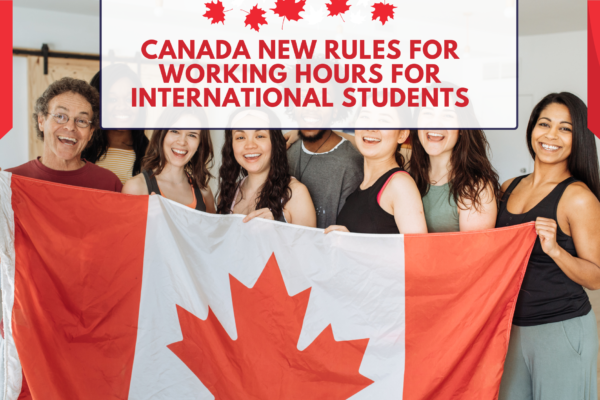
Canada’s International Student Working Hours | New Regulations
As the current policy on full-time employment nears its expiration date on April 30, Minister Marc Miller is set to make a significant speech on the working hours allotted for overseas students in Canada. The imminence of comprehending the nuances of these rules and their wider ramifications is highlighted by the approaching deadline. This paper offers a thorough analysis of the changing environment around international student working hours, illuminating impending adjustments, their effects, and possible future directions. Stakeholders are looking forward to Minister Miller’s statement because they understand how important these changes will be in determining the educational and financial experiences of foreign students. They also recognize that there will be uncertainty around the future of working hour allowances for these students. Since “International Student Working Hours” is a focal term throughout this discourse, it highlights the main idea of this topic, which is the critical function that working hour regulations have in promoting the integration and general well-being of foreign students in Canada. This article aims to clarify the difficulties surrounding this subject matter while offering insightful information to all parties involved through thorough study and educated discussion. Minister Miller’s Announcement: The new regulations controlling overseas students’ off-campus employment hours are set to be discussed during a media availability session with Minister Marc Miller in the Foyer of the House of Commons of Canada at 1:00 p.m. EDT (Toronto time). This much awaited seminar seeks to shed light on and clarify the recent regulation amendments pertaining to International Student Working Hours. With repercussions for both foreign students and the Canadian job market, stakeholders are anxiously awaiting Minister Miller’s announcement. The goal of the session is to guarantee openness and assist stakeholders in making well-informed decisions by addressing relevant issues and prospective changes to working hour regulations. Current Policy Overview: This short-term regulation, which was put in place in reaction to the COVID-19 outbreak, allowed a particular group of overseas students to work full-time jobs through April 30. This preemptive action was intended to provide additional sources of financial support for overseas students while mitigating the labor shortage faced by Canadian businesses. If someone is interested in learning more about the requirements for full-time work, they can click the link given. These changes highlight how important it is to strike a balance between the demands of the job market and the working hours of international students in order to create a peaceful and encouraging environment for all parties. Impending Changes: There are indications as of April 18 that the policy regarding full-time working hours is not going to be continued past April 30. Notwithstanding, the Immigration, Refugees, and Citizenship Canada (IRCC) has alluded to prospective future modifications, such as the potential augmentation of off-campus work hours for international students to a maximum of thirty hours weekly. The proposed regulation adjustment concerning International Student Working Hours is a positive development for students looking for extra revenue streams and is in line with the changing demands of the Canadian labor market. Anticipated Developments: The upcoming statement by the minister of immigration about the possible introduction of a 30-hour work week policy for overseas students is greeted with hope. In Canada, throughout the academic year, students are now permitted to work 20 hours a week. There has been a great deal of excitement among international students about the possibility of raising this cap to 30 hours per week. This change might have a big impact on International Student Working Hours giving students more freedom and chances to get financial aid for their education. Future Prospects: It is commonly believed that Canada may increase the number of hours that foreign students are able to work in order to better serve the changing demands of both students and the Canadian labor market. This proposed change will address labor market demands and provide additional flexibility and opportunities for students by meeting the changing needs of international student working hours. These changes would help alleviate the persistent labor shortages in a number of the nation’s industries while also giving students more financial security. While simultaneously acknowledging the financial limits experienced by foreign students, this prospective increase of international Student Working Hours is a proactive reaction to the changing needs of the job market. By permitting students to work longer hours, Canada can make better use of the abilities and skills of its foreign student body, which will promote resilience and economic growth. Expanding International Student Working Hours: As international students contribute significantly to Canada’s academic and cultural landscape, it’s imperative to consider measures that support their financial well-being. The proposed increase in working hours to 30 per week holds promise for students seeking additional income avenues. This potential policy shift would mark a positive step towards fostering a more inclusive and supportive environment for international students in Canada. Challenges and Considerations: While there are a number of benefits to the possible increase of working hours, there are also unique difficulties and factors to take into account. It is essential to make sure that overseas students are able to balance their academic obligations and workloads. Furthermore, careful attention is needed to ensure compliance with visa laws and avoid labor abuse. These factors need to be carefully considered since they are especially important when discussing International Student Working Hours. Addressing Student Needs: Considering that overseas students have a variety of demands, governments have to make an effort to put programs in place that are specific to their unique circumstances. Authorities demonstrate their commitment to enhancing the whole student experience and creating an inclusive environment that encourages both academic success and personal growth by extending International Student Working Hours. Conclusion: Finally, Minister Marc Miller’s impending statement about changes to foreign students’ off-campus employment hours in Canada has a lot of potential to benefit students and the country’s economy. There is a palpable sense of excitement among foreign students about the potential expansion of working hour restrictions, even if the specifics of the upcoming legislation are yet unknown. Aware of…







